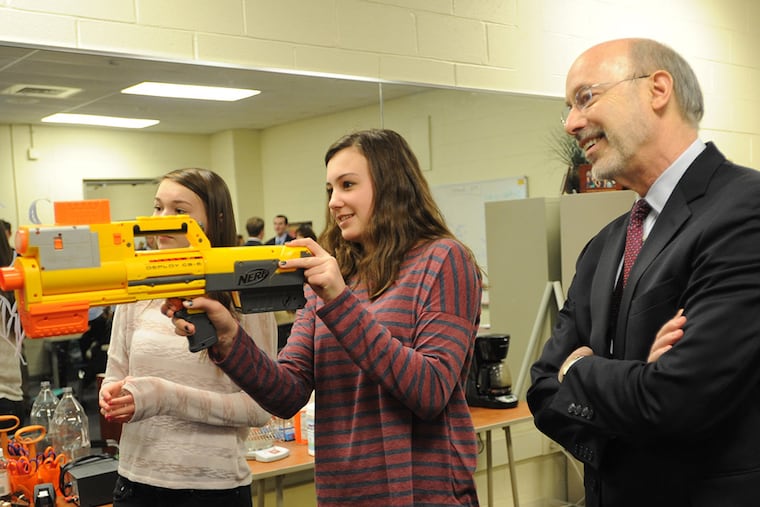Supporting wider success for city students
Philadelphia students received great news last week from Gov. Wolf and Mayor Nutter.

Philadelphia students received great news last week from Gov. Wolf and Mayor Nutter.
In a powerful show of support for the School District of Philadelphia, they proposed a total of more than $260 million in new funding for city schools.
We are still a long way from final negotiated budgets, of course, but the governor and mayor are committed to changing the story we tell about our schools. I will do all I can to help them.
While headlines focus on fiscal crises and adults arguing, the whole story of the School District is the story of every child in the district.
Even with our challenges, boys and girls across the city are busy learning, led by their fantastically resourceful teachers. Our schools are safer. There is a more challenging curriculum districtwide. A citywide effort is helping young students learn to read.
Several innovative schools have opened to great excitement and may shape the entire district with new evidence-based instructional practices.
We have implemented 100 percent site selection - enabling school-based teams to determine who fills teaching vacancies - because nothing is more essential to the success of principals, and the schools they lead, than being able to hire their own staff.
And we have designed a sophisticated accountability measure that compares achievement between schools with similar students, allowing us to replicate successful approaches while providing more targeted help to struggling students.
Even student lunches are healthier.
I see the results almost every day in vibrant classrooms and hallways filled with inspired student work.
And it's not just me. Many parents who first visit their local school are surprised to discover that learning is going on. The principal has a vision. The community is engaged. Children talk about college.
Are we where we want to be? Not even close. Student performance is far, far too low. Outcomes are not close to equitable. Most schools lack anywhere near adequate staffing and materials.
But if our first year was about stabilizing a precarious system, and our second was focused on setting ambitious student learning goals and aligning resources in support of those goals, our third year and beyond will be about ensuring that every child benefits equally from those resources.
That's what the proposed new state and city budgets will help make possible.
We have a new statement of goals and values, Action Plan 3.0, that lays out how it will happen.
The plan includes 25 steps for success. The most important is a new equity-driven approach to help our schools lift the achievement of every public school student in Philadelphia wherever they live, whatever their background or life experience.
A school system can't negate the effects of poverty and trauma, but it can - it must - give each child the opportunity to be educated well and to have a real chance at success after graduation.
It must respond to the 16-year-old young man I met recently whose mother was attempting to enroll him in eighth grade.
It must offer quality options to the parent who testified to the School Reform Commission about her determination to send her daughter to a neighborhood school.
It must provide the H.A. Brown Elementary School fifth-grade student government leaders with secondary school programs that challenge them to reach their full potential.
To achieve that, we will concentrate leadership, expertise, and resources in four school networks organized by shared educational needs: our neighborhood schools, which most of our students attend; our most struggling schools; schools serving at-risk students; and nontraditional, innovative schools.
Each network will have a leader experienced in the issues faced by their students in that network, as well as increased funding for instruction, particularly for higher-need children, including those with disabilities and English-language learners, and to foster socio-emotional growth.
We will continue to supplement district efforts to turn around chronically struggling schools and provide high-quality options to at-risk students with external providers, including Renaissance charter schools, which have succeeded with research-based approaches.
Separately, we will offer some high-performing schools near-total autonomy as long as they meet performance targets. While bound by legal and collective bargaining rules, they will have flexibility in areas such as budgeting, curriculum, management, and training.
In a sense, it will take the whole city to educate all of its students.
The plan will cost about $300 million. To get there, we need to pursue structural budget fixes that include a fair student funding formula, revisions to the state's inequitable charter school funding law, fixed-costs relief, and new recurring revenue from the state and city.
There are no shortcuts in the incredibly challenging work of improving learning and delivering it more equitably across a city as big, diverse, poor, and complicated as ours.
We are not offering a silver bullet, magical thinking, or a cure-all managerial fix.
We do not believe any single reform gets you there - not charter schools, not better standards, not blaming so-called "bad" teachers.
We do believe that you need to create schools that prioritize the needs of the most underserved children.
You need a system, and we are creating one, that gives adults on the front lines with students every day - teachers and their colleagues - the best possible chance to succeed.
Because then our children will have that.
William R. Hite is superintendent of the School District of Philadelphia